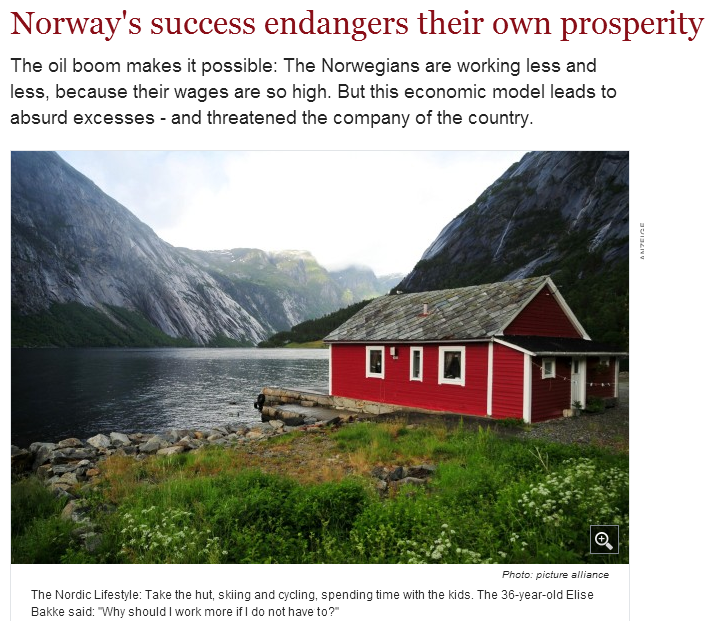Tick tock, tick tock.
The prosperity can’t exist for much longer if these utopians keep refusing reality. Just what are they going to do with all those immigrants lured to the shores of this Nordic cornucopia once the milk and honey run out?
Source Die Welt.
Lower wages, higher working hours, cuts in social services – that would be political suicide. A generous welfare state and the strong emphasis on equality for many Norwegians are still pillars of their society.
It sounds absurd: the Norwegians have become to well off. Ironically, her dazzling situation is threatened experts say of the economy and prosperity. The once desperately poor country has risen by oil discoveries in the North Sea, to be one of the richest nations. And its inhabitants are now working less and less.
“We have the money for the Nordic lifestyle : drive to the hut, skiing and cycling, time with the kids to spend, “says the 36-year-old Elise Bakke, which has reduced their working hours for a major telecom company to six hours” . “Why should I work more if I do not have to?”
The high wages allow Norwegians to work fewer hours, the hours go back. Although the unemployment rate is only three percent, the employment rate reached 61 percent, not even the level of Greece.
Thursday evening more Norwegians already left capital than on Friday, says Ivar Fröness, professor of sociology at the University of Oslo. They are taking more and more long weekends.
“We’ll take for granted that we have a house, a cabin in the mountains and maybe even have one on the coast.” The result is that the economy may soon become victims of their success.
A pizza for 20 euros
Because wages are rising more and more – which means that tourists who use services, for example, in restaurants claim to get watery eyes over the prices. A margherita pizza is the equivalent of 20 euros in Oslo are not uncommon.
Businesses also complain: Labor costs have increased since 2000 by 63 percent. That’s six times more than in Germany or in neighboring Sweden.
The companies raise prices to compensate for the costs, and are losing jobs. Kvaerner, a supplier of oil rigs, lost recently a key mission of the state oil company Statoil to the Daewoo Shipbuilding & Marine Engineering in Korea.
Kvaerner was too expensive. Norwegian companies take up to 15 percent higher prices than the competition, says Minister Jan Arve Haugan Kvaerner. “Also, can not compensate for the high quality.”
Other companies come up with the Nordic costs hardly clear. The budget airline Norwegian Air has threatened to move to Thailand and aircraft to fly with crews from Asia Europe. The largest oil producer in the country, Aker Solutions will indeed set 4000 engineers, but most are only a third of Norwegians.
Wages and living standards that attract 50,000 immigrants in the five-million-inhabitant country – but without economic effect to economist Dag Aarnes ensures the Norwegian Business Association. Because productivity is not climbing.
A Life in Abundance
Just 100 years ago million poor Norwegians emigrated from the country, which allows only three percent of its arable area, and to seek their fortune in the United States. If one looks today, however with the keywords emigration and Norway, shows Google results only on immigration in the Scandinavian country.
But government and Central Bank warn of the end of the success story. The welfare model to bring the people to the labor market has to turn its back, it is with the central bank.
The state has reserves of 550 billion euros, or about 110,000 euros a head – and has been raging a debate as to whether the government has any more oil crowns that would have to be put in the infrastructure and welfare, instead of saving for the time when the black Gold is no longer bubbling.
“Oil is a metaphor for the lottery win,” says Professor Fröness. “The abundance has arrived slowly in the society, people do not perceive it, because it has come step by step.”
No one will reduce welfare during election season
This danger is only a minor concern for the parties as there are elections scheduled for September and no one dares to address welfare matters. Lower wages, more work hours, reductions in welfare: all of that would amount to political suicide. A generous welfare state and a strong emphasis on equality are still considered by Norwegians to be pillars of their society.

